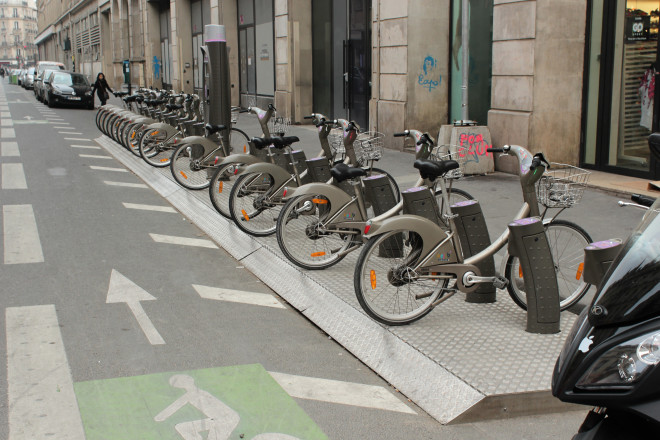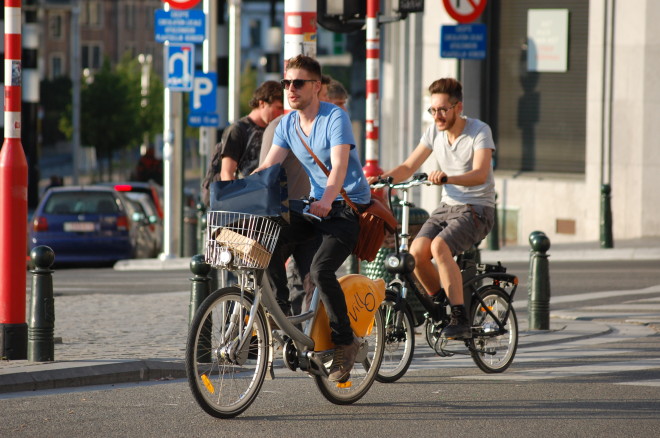
Bike Sharing: Not Just For Europeans
Bike sharing is well and truly established as a global player in the world of transport. Gone are the days when it was something done by those ‘crazy’ Europeans. ECF spoke to Susan Shaheen, who has written a chapter on bike sharing in the upcoming book ‘City Cycling’.
About “City Cycling”
City Cycling has just about everything you can imagine in it when it comes to cycling. It’s a must read for anybody working in the field or transport and for bicycle advocates, it’s going to be the bible.
“City Cycling”appears in print in September but can already be ordered at a pre-publication discount ($18) at Amazon and Barnes and Noble.
For further information about the book, including a detailed table of contents and listing of contributors, see the following website.
Bike sharing has come a long way. Think back to the mid-1960’s when some enlightened folk decided to place 50 white bicycles around the city of Amsterdam for free public use. The initiative was soon dropped when most of the bicycles either ended up in the canals or in pieces, but the idea stuck.

Amsterdam's White Bikes. Credit: The Big Feed
Fast-forward half a century and these systems are everywhere.
“There are now more than 236,000 bicycles being shared on four continents,” says Susan Shaheen, who directs the Transportation Sustainability Research Center and has written extensively on bike sharing. In the upcoming book ‘City Cycling’ Shaheen plots the global rise in bike sharing.
“It really took off after about 2007 when Velib' was launched. This represented a new generation in bike sharing where we moved from what we call 2nd generation systems, [coin deposit systems] to much more sophisticated IT based ones. Velib' was among the first to implement this on a broad scale with over 20,000 bikes,” says Shaheen.
Yet while Velib' was the game-changer, the demand for these systems is now stretching far beyond Europe.
“The [bike-sharing] phenomenon has really taken off in North America. In just a few years, we’ve gone from 5 to 12 programs with another 20 to launch in 2012 and we’re charting another 34 that should launch at some time between 2013 and 2014.”
But Shaheen’s research shows that North America is not alone in this bike share boom. In 2010, Mexico City launched EcoBici, which operates with 1,200 bicycles and 90 docking stations. In 2008, Brazil launched two bike sharing programs—UseBike in São Paulo and Samba in Rio de Janeiro. Following Samba’s launch, Chile started a public bike sharing program, which operates 180 bicycles and 18 stations.
And then of course there is Asia, which has now emerged as the world’s largest growing market for bike share systems.
“One of the largest and most famous public bike sharing programs in Asia is the Public Bicycle system in Hangzhou, China. This system has over 60,000 bicycles and 2,400 bike stations,” says Shaheeen.
The Biggest, Baddest Bike-Share in the World: Hangzhou China from Streetfilms on Vimeo.
Infrastructure: Now or Later?
So, should we improve bicycle infrastructure first or can we go right ahead and put a system into an untamed environment?
“Both approaches have been tried,” says Shaheen, “But I think it’s preferable to have it go in concert, or to have infrastructure to be put in place beforehand.”
 Photo: The Velib system. Credit: Coyau
Photo: The Velib system. Credit: Coyau
And there’s no doubt that Parisian bicycle infrastructure was woeful before Velib' came along. Which goes to show, bike share systems can be a catalyst for change. Velib’s 2007 launch saw the number of people cycling go up by 70% within the first year. Similar results were seen in in Lyon, which documented a 44% increase in bicycle trips. Even more encouraging was the fact that 96% of Lyon’s public bikesharing members were new users who had not previously bicycled in the city center.
With all this growth, the only thing capable of stopping the bike share boom seems to be helmet laws. For now, let's keep on sharing.
Want to read more? Make sure you check out our City Cycling series with John Pucher and Ralph Buehler here.
 About the Interviewee
About the Interviewee
Susan Shaheen is a lecturer in the Civil and Environmental Engineering Department and an associate research engineer at the Institute of Transportation Studies at the University of California, Berkeley. She is also a co-director of the Transportation Sustainability Research Center and has written a chapter in the upcoming book City Cycling.
Julian Ferguson is the Communications Officer for the European Cyclists’ Federation. Originally hailing from Australia and a keen bicycle advocate, he plans one day to ride his bicycle from Brussels to Melbourne
Contact the author
Recent news!
Upcoming events
Contact Us
Avenue des Arts, 7-8
Postal address: Rue de la Charité, 22
1210 Brussels, Belgium












